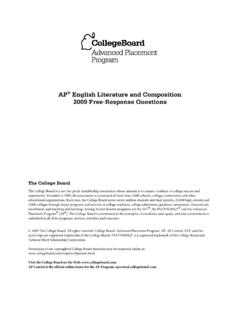Transcription of PROS & CONS of a National Popular Vote
1 JUNE 2020 VOL. 99 NO. 6A Pro & Con MonthlyThe Electoral college PROS & cons of a National Popular VoteShould the United States change the way it elects presidents? Foreword: The Electoral college ..2 How the Electoral college Works ..3 Does the Electoral college Need Reform? ..5 The National Popular vote ..10 States in the National Popular vote Compact ..13 Voter Trends in 2016 ..14 Public Opinion on the Electoral college ..16 What Congress Is Doing on the Electoral college ..17 PRO & CON Extra TopicsMail-In Voting ..30 Ending Surprise Medical Billing ..31 Jason Pye ..19 FreedomWorksJames Wallner ..23R Street Institute Matthew Spalding ..27 Hillsdale CollegeCONPRORep. Steve Cohen (D-Tenn.)
2 18 Adam Eichen ..20 Equal Citizens Darrell M. West ..24 Brookings Institution2 Congressional Digest n n June 2020 He who decides a case without hearing the other side ..Tho he decide justly, cannot be considered just. SenecaF O R E W O R DThe Electoral CollegeShould the United States change the way it elects presidents? In June 2019, Oregon Gov. Kate Brown (D) signed a bill that she said would make her reliably blue state part of the National conversation around presidential elections. The signing made Oregon the 15th state, along with the District of Columbia, to join the National Popular vote Interstate Compact, an effort to ditch the Electoral Col-lege.
3 Once enough states join the compact, it could change the way the elects presidents, moving the country towards an electoral system based on the Popular vote . The Electoral college has long been controversial, with critics saying it concentrates presidential campaigns into a handful of swing states and can lead to presidents being elected without a majority of votes. The 2016 elec-tion, in which Republican candidate Donald Trump de-feated Democrat Hillary Clinton in the Electoral college despite losing the Popular vote by more than million votes, has prompted a new look at the pros and cons of the Electoral college and has given more momentum to the National Popular vote Article II, Section 1 of the Constitution, the president and vice president are chosen by electors who are nominated by their states.
4 The intent was to ensure a National consensus when there were more than two major parties and multiple candidates. Most states have laws that bind their electors to vote for the Popular vote winner in their state, with a fine for those who fail to do so. Currently, a candidate needs to secure 270 of 538 electoral votes to , a solid chunk of those 538 votes are in states where the outcome is rarely in doubt. Candidates can ef-fectively ignore those states when campaigning, and the diversity of voices within those states is marginalized. Although the Electoral college has aligned with the Popular vote more than 90% of the time, there have been five elections in which the president did not win a ma-jority.
5 Two of those have come in the past 20 years, each time favoring the Republican candidate, leading Dem-ocrats to worry that they could be at a disadvantage as Midwestern and rust Belt states grow more conservative. Sen. Elizabeth Warren (D-Mass.), who ran for the 2020 Democratic nomination, even called for the Electoral college to be abolished. I believe presidential candidates should have to ask every American in every part of the country for their vote , not just a few random states that happen to be close, Warren wrote in 2019. According to a March 2020 poll from the Pew Research Center, 58% of Americans back a National pop-ular vote , up from 51% in a poll immediately following the 2016 election.
6 Critics say that abolishing the Electoral college would diminish the role of smaller states in presidential politics. Why would a candidate spend time and money in a small state like Nebraska or Wyoming when they could get more votes campaigning in Texas or Califor-nia? The Electoral college also forces candidates to adopt policies that appeal to centrist voters, rather than simply campaigning to activate a majority of partisan Republicans have dismissed Democrats con-cerns as sour grapes and say there s no need to overturn a system that has worked for 58 presidential elections. The Electoral college would have to be replaced through a constitutional amendment, but attempts to move one through Congress have come up short.
7 Even if an amendment passed both chambers of Congress, 38 states would need to ratify it, an unlikely event given the power the Electoral college gives small states. The National Popular vote movement, however, sidesteps that process by focusing on state legislatures. It would kick in once states totaling 270 electoral votes approve the measure, ensuring that the Popular vote win-ner would also prevail in the Electoral college under current rules. As of May 2020, states totaling 196 votes have approved it, including the purple state of Colorado (in November 2020, Colorado voters will vote on a ballot measure that could remove the state from the compact). There s no chance that the National Popular vote Interstate Compact will clear enough states ahead of the 2020 election, but the Electoral college debate is sure to stay on the front burner, especially if the winner of the Electoral college loses the Popular vote again.
8 N3 Congressional Digest n n June 2020 How the Electoral college WorksWho s really voting for the president?The Founding Fathers established the Electoral college in the Constitution, in part, as a compromise between the election of the President by a vote in Congress and election of the President by a Popular vote of qualified citizens. However, the term Electoral college does not appear in the Constitution. Article II of the Consti-tution and the 12th Amendment refer to electors, but not to the Electoral college . Since the Electoral college process is part of the orig-inal design of the Constitution it would be necessary to pass a Constitutional amendment to change this ratification of the 12th Amendment, the expan-sion of voting rights, and the States use of the Popular vote to determine who will be appointed as electors have each substantially changed the different proposals to alter the Presidential election process have been offered over the years, such as direct nationwide election by the eligible voters, but none has been passed by Congress and sent to the states for ratification as a Constitutional amendment.
9 Under the most common method for amending the Constitution, an amendment must be proposed by a two-thirds majority in both houses of Congress and ratified by three-fourths of the proposals have been made to change the Elec-toral college process? Reference sources indicate that over the past 200 years more than 700 proposals have been introduced in Congress to reform or eliminate the Electoral college . There have been more proposals for Constitutional amendments on changing the Electoral college than on any other subject. The American Bar Association has criticized the Electoral college as archa-ic and ambiguous and its polling showed 69 percent of lawyers favored abolishing it in 1987.
10 But surveys of political scientists have supported continuation of the Electoral college . Public opinion polls have shown Amer-icans favored abolishing it by majorities of 58 percent in 1967; 81 percent in 1968; and 75 percent in on the viability of the Electoral college system may be affected by attitudes toward third parties. Third parties have not fared well in the Electoral college system. For example, third party candidates with region-al appeal, such as [South Carolina] Governor [Strom] Thurmond in 1948 and [Alabama] Governor [George] Wallace in 1968, won blocs of electoral votes in the South, but neither came close to seriously challenging the major party winner, although they may have affected the overall outcome of the last third party, or splinter party, candidate to make a strong showing was Theodore Roosevelt in 1912 (Progressive, also known as the Bull Moose Party).





